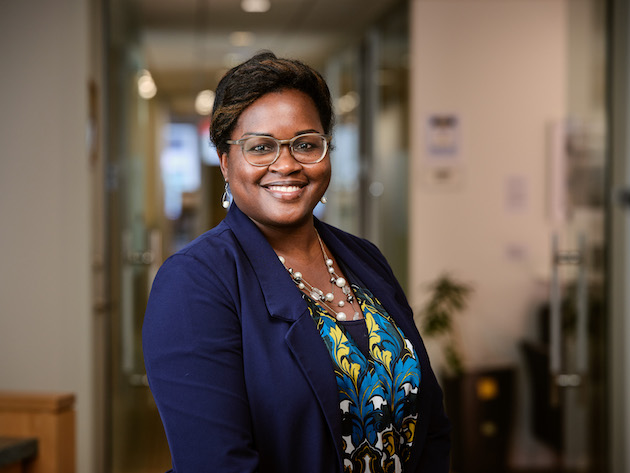ARTICLE AD
 Cyclone Idah in 2019 caused catastrophic damage and a humanitarian crisis in Mozambique, Zimbabwe, and Malawi, leaving more than 1,500 people dead and many more missing. Credit: Denis Onyodi / IFRC/DRKby Aishwarya Bajpai (baku)Saturday, November 16, 2024Inter Press Service
Cyclone Idah in 2019 caused catastrophic damage and a humanitarian crisis in Mozambique, Zimbabwe, and Malawi, leaving more than 1,500 people dead and many more missing. Credit: Denis Onyodi / IFRC/DRKby Aishwarya Bajpai (baku)Saturday, November 16, 2024Inter Press ServiceBAKU, Nov 16 (IPS) - The irony is that at forums like COP29, dubbed the finance COP, rich countries often behave as though they can sidestep their financial obligations, Yamide Dagnet, Senior Vice President, International at the Natural Resources Defense Council (NRDC), says.
Yamide gave IPS an exclusive interview in which she shared her wisdom on the so-called finance clubs, the Loss and Damage Fund, the New Collective Quantified Goal (NCQG) and COP29's focus on advancing climate finance.
Reflecting on her recent experience at COP16, Dagnet recalled, "I attended the Convention on Biological Diversity (CBD) in Cali, Columbia for the first time. While there were breakthroughs for local communities and businesses, the process ultimately ended in disarray, particularly regarding finance."
She criticized the lack of accountability from developed countries, stating, "In these forums, developed countries often behave as if they can sidestep their financial obligations. But that can't continue. We must keep engaging and pushing for accountability."
Addressing the influence of the recent U.S. elections, Dagnet remarked, "The elections overshadowed everything. Many developed countries feel overwhelmed, fearing they'll need to cover for the U.S., which has historically fallen short on its commitments and is now attempting a comeback. The ambition of their public commitments remains disappointingly low."
On the broader challenge of climate finance, she added, "Reaching USD 100 trillion in finance will require an enormous effort. What's being proposed now simply doesn't match the scale of the crisis."
She explained that compared to a year or even a few months ago, many of the most vulnerable countries are focused on ensuring that funding is allocated fairly.
 Yamide Dagnet, Senior Vice President, International at the Natural Resources Defense Council (NRDC).
Yamide Dagnet, Senior Vice President, International at the Natural Resources Defense Council (NRDC).Questions remain about how much will go to the Least Developed Countries (LDCs), small island states, and Africa. There's still a push to direct at least half of the funds toward mitigation efforts. Accessibility and transparency in allocation are critical.
"This isn't charity," she emphasizes. "It's about investment. The cost of inaction and non-investment far outweighs the investment required to address these issues effectively."
Further addressing carbon credits, Dagnet remarked, "While there have been changes, transformations, and innovations—mainly driven by developed countries—carbon credits can play a role but shouldn't be overestimated. There's been a lot of unrealistic expectations about their potential, with talk of billions in funding. But then what? We need to approach this carefully and get it right."
Dagnet emphasized the need for environmental integrity and equity to be central to climate initiatives, stating, "For these systems to be robust and equitable, environmental integrity must be at their core. Without it, there won't be a fair distribution of benefits, especially for those who need it the most."
She pointed to the negotiations around Article 6.2, noting, "While a common market can offer opportunities, there's clear evidence of how things can go wrong. Every effort must be made to ensure it works effectively and fairly."
Reflecting on the human cost of climate inaction, Dagnet shared, "I often think about Mozambique. They face adverse conditions year after year, leaving communities in a constant state of crisis. They can't rebuild schools properly and live in tents for years, with their livelihoods repeatedly destroyed. Is this the future we want to accept?"
On the Loss and Damage Fund, Dagnet emphasized the importance of viewing finance as a means to an end rather than the end itself.
"What we see in Mozambique is a clear result of losses and damages. Following the breakthrough of establishing a Loss and Damage Fund, the priority is to ensure it is regularly replenished. While last year's pledges reached about USD 700 million, it's far from enough to provide adequate support."
She highlighted the multifaceted nature of addressing loss and damage: "There's a need to mitigate damages, adapt to extreme conditions like heat, and address the limits of adaptation. For example, with sea level rise, adaptation can only go so far before people are forced to migrate. These costs—tangible like relocation expenses or intangible like cultural and psychological impacts—must be addressed through diverse support mechanisms."
Dagnet stressed the need for grant-based solutions designed with input from local communities.
"Solutions must not be purely top-down. Discussions within the Loss and Damage Fund should ensure funds reach frontline communities. However, some countries resist this approach, preferring centralized control, while local communities and civil society know they need direct access to funds."
Innovative mechanisms for community benefit-sharing are crucial: "Big corporations, including pharmaceutical and tech companies, often use data from local communities without adequate compensation. Implementing a levy on such data usage could create a fund to benefit these communities. A percentage of profits derived from local knowledge should return to those communities, ensuring they see tangible benefits from their contributions."
IPS UN Bureau Report
Follow @IPSNewsUNBureau
Follow IPS News UN Bureau on Instagram
© Inter Press Service (2024) — All Rights ReservedOriginal source: Inter Press Service

 1 month ago
21
1 month ago
21 